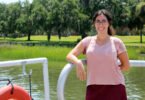Athens, Ga. – Researchers from a variety of disciplines will present their work with robotics in a seminar hosted by the University of Georgia Ideas for Creative Exploration, or ICE, an interdisciplinary initiative for advanced research in the arts. The event will be held Oct. 24 at 7 p.m. in room 248 of the Miller Learning Center. This seminar is free and open to the public.
The schedule of presentations includes the following UGA faculty members:
· David Z. Saltz, head of the department of theatre and film studies and the executive director of ICE. Saltz is a specialist in modern drama, performance theory, the philosophy of art and directing. His primary research focus has been the interaction between live performance and digital media, including robots.
· Walter D. Potter, professor of computer science and director of the Institute for Artificial Intelligence. Potter is a member of the robotics research group, which focuses on the development of autonomous mobile robots, or AMRs.
· Jason Cantarella, associate professor of mathematics. Cantarella’s mathematical interests lie between geometry and topology, including optimal geometry problems such as “What is the shape of a tight knot?”
· Chi Thai, associate professor of biological and agricultural engineering. Thai’s areas of specialty include spectroscopy and spectral imaging for biosystems, computer-mediated learning technologies and educational humanoid robotics. Thai is a robotics instructor for the UGA-Duke TIP program and directs the Robotics Club at UGA.
Formed in 1999, ICE is a catalyst for innovative, interdisciplinary creative projects; advanced research and critical discourse in the arts; and creative applications of technologies, concepts, and practices found across disciplines. It is a collaborative network of faculty, students and community members from all disciplines of the visual and performing arts, in addition to other disciplines in the humanities and sciences.
ICE is supported by the Franklin College of Arts and Sciences, the Office of the Vice President for Research and the Graduate School.






